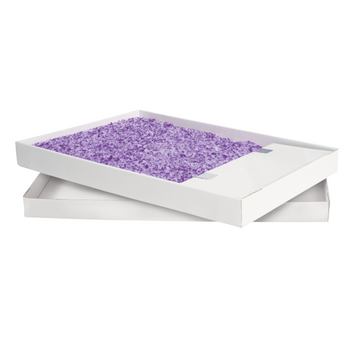
How Often Should Cats Poop? Understand Your Cat’s Health
When it comes to our furry companions, every detail matters — especially when it relates to their health and well-being. As a devoted cat parent, you might have found yourself pondering, "How often should my cat use the litter box?" It's a simple question with a not-so-simple answer, as the frequency of a cat's bowel movements can vary widely depending on several factors. Understanding these nuances is vital not only for maintaining the health of your cat but also for spotting potential health issues before they become serious.
Here at PetSafe®, we're dedicated to helping you ensure that your cat is healthy and happy for a lifetime. This guide will walk you through what’s normal in cat digestion, what isn’t, and how you can keep your beloved feline feeling their best. Whether you're setting up a new litter box or just looking to keep your cat healthy, you’re in the right place to learn about everything from diet to the potential warning signs of digestive disturbances. Let's dive into the details of your cat's health and make sure they're as happy as they can be!
What is Normal for Cats?
In the world of cats, 'normal' can cover a broad spectrum, especially when we talk about how often they should be visiting their litter box. Generally, most healthy adult cats will have bowel movements anywhere from once to twice a day. This frequency is a good baseline, but like humans, every cat is unique, and so are their digestive habits. Healthy kittens, being more active, may go more frequently, while older cats might not need to go as often.The appearance of your cat's poop is just as important as the frequency. Ideal cat poop should be firm, shaped like a log, and a rich chocolate brown color. It shouldn't be too hard or too soft, and while cat poop won’t ever smell like roses, it shouldn’t be overwhelmingly foul either. If you're setting up a new home for your kitty, make sure you choose the right cat litter that helps you easily monitor these aspects.
Factors Affecting How Often Cats Poop
Just as diet and lifestyle can change human bathroom habits, they can significantly alter your cat's too. Here are some critical factors to consider:
- Diet: What your cat eats plays a pivotal role in how often they poop. Cats fed with higher-quality, nutrient-dense foods may have fewer bowel movements than those on a lower-quality diet because their bodies are able to use more of what they ingest.
- Hydration: Water intake is crucial. Cats that don’t drink enough water can become constipated, which is why providing a cat water fountain might encourage them to drink more.
- Exercise: Active cats tend to have more regular digestive processes. Encouraging play can help keep everything moving smoothly in your cat’s gastrointestinal tract.
- General health: Various health conditions, from the benign to the serious, can influence your cat's bowel movements. For example, cats with thyroid issues might show changes in their litter box habits.

Signs of Potential Health Issues
As a pet parent, you should always be vigilant for signs that indicate something might be off with your cat’s health. Changes in litter box habits often provide the first clue. Here’s what to look out for:
Frequency changes: If your cat is going less often than usual, they might be constipated. On the other hand, if they’re going more frequently, especially if the stool is loose, it could be diarrhea.
Appearance changes: Any significant changes in the color, consistency, or smell of your cat’s poop can be a sign of health problems. For example, black, tarry stools or blood in the poop needs immediate veterinary attention.
Behavioral changes: Watch how your cat acts when using the litter box. Straining or crying while standing in the litter box can be a sign of discomfort and a cue to consult your veterinarian.
Improving Your Cat's Digestive Health

Maintaining your cat's digestive health involves more than just monitoring the litter box. Here are some proactive steps you can take to ensure your cat remains healthy:
Schedule regular vet visits: Regular check-ups can catch potential problems before they become serious.
Maintain a proper diet: Feed your cat a balanced diet suited to their age, breed, health status, and lifestyle. Consult with your vet to choose the best food.
Keep them hydrated: Always provide fresh water, and consider a source of moving water like a pet fountain to encourage your cat to drink more.
Encourage exercise: Keep your cat active with toys and regular playtime to help maintain a healthy weight and support digestive health.
Conclusion
Understanding and monitoring how often your cat poops is a crucial part of keeping them healthy. By keeping an eye on the litter box, you're not just cleaning up; you're checking in on your cat’s health. Remember, a healthy cat is a happy cat, and knowing what's normal for your pet will help you keep them bouncing with joy and vitality. Always feel empowered to reach out to your vet with concerns. With regular vet visits, a healthy diet, hydration, and exercise, you can put your cat on the path to digestive success!
Get Email Updates
Subscribe to the latest news, promotions, & more from PetSafe® brand.
Sign up today for the latest news, promotions, and more from PetSafe® brand.





